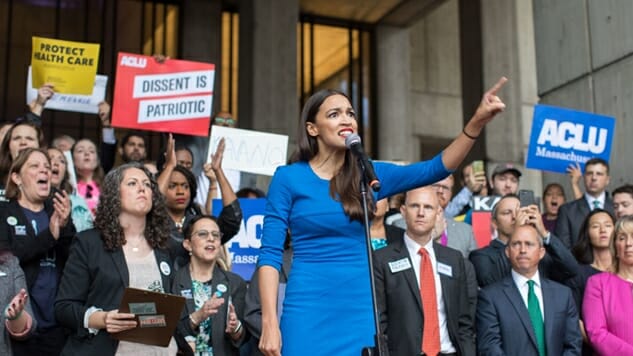Democrats Can Win Over Millennial Republicans With Socialism
Photo by Scott Eisen/Getty
In early 2017, Democratic Speaker of the House, Nancy Pelosi, said that the Democratic Party is “capitalist, and that’s just the way it is.” While Pelosi’s recent appointment of Democratic Socialist Alexandria Ocasio-Cortez to the incredibly powerful House Financial Services Committee demonstrates, she is more flexible than her famed inflexible statement made her seem—but the Speaker may want to revisit her assumption underlying the assertion that she was making.
The longstanding Democratic line is that we must move to the middle in order to win over voters who see appeal in both parties’ platforms. Well, considering that a majority of all Republicans want socialized medicine, it’s high time that we redefine what policies exactly fall into the “middle” of the electorate.
The Democratic Party as a whole has jolted to the left since 2016, as the semi/not so semi-socialist politics of the two largest generations in history, millennials and Gen Z, has officially arrived on the doorstep of our nation’s capital. This generational shift is so stark that even a significant chunk of millennial Republicans have a positive view of socialism. Here are five examples from a September 2018 BuzzFeed News and Maru/Blue poll, and the 2019 World Economic Forum poll from Axios/Survey Monkey (credit to Will Jordan of polling research firm Global Strategy Group for drawing my attention to this brand new poll).
1. Latest polling reveals that 29% of millennial Republicans have a positive view of socialism
Gallup polling from August 2018 shows the same level of socialism disapproval amongst all Republicans (71%) as Axios/Survey Monkey reveals for millennial Republicans (70%), while Gallup says that only 16% of all Republicans approve of socialism. This must mean that where some older Republicans fall into “I don’t know” on socialism, about 13% of the younger ones are turning into “yes’s.”
The split on views of socialism can be neatly divided into who experienced McCarthyism and who didn’t, given that Gallup consistently reveals lower approval of socialism amongst older generations (28% for age 65+ and 30% for ages 50 to 64) than younger ones (41% for ages 30 to 49 and 51% for ages 18 to 29).
Here’s what this means for the “capitalist and that’s just the way it is” Democrats: 2015 U.S. Census data found that there are 75.4 million millennials, meaning that per this most recent polling, there are roughly 8.3 million Republican millennial votes that Democrats could win by backing outright socialism (to give that figure some context, Hillary got 2.8 million more votes than Trump did in 2016).
2. 31% of young Republicans say inequality is a bigger problem than over-regulation of the market
As the excesses of our Digital Gilded Age have become unimpeachable, we are seeing many folks accept that the system is fundamentally broken, and almost any solution is deemed preferable to the status quo, as John Hart wrote at RealClearPolitics last summer:
2. America’s anti-incumbent mood is less ideological than Republicans realize. Rick Santelli’s rant is often described as the start of the Tea Party. But that moment was only one chapter in a quarter-century-long anti-incumbent movement that remains ongoing. In fact, the movement that became the Tea Party wasn’t started by conservatives but rather by a Democratic outsider named Virgil Cooper.
3. 39% of millennial Republicans want the federal government to reduce the gap between the wealthy and the poor
This is versus 37% who believe “strongly” that the government should not, and 22% who believe “somewhat” they should not. This is proof of Hart’s assertion at RCP last year that “We live in an age of movements, not parties.”
National Democrats are terrified of the rise of Ocasio-Cortez, and for good reason. They may not have any more influence over the socialist surge than Republicans had over Donald Trump’s rise in 2016. Trump broke through Republican “establishment” opposition as if it didn’t exist — because it didn’t. Today’s national parties are event planners for movements. Parties belong to movements more than movements belong to parties. Movements like the Tea Party, and now Democratic socialism, have supplanted party structures as organizers of ideas and debate.
As a longtime aide to U.S. Rep. and then-Sen. Tom Coburn, I can testify to the fact that confronting entrenched power was not mere theory. In fight after fight — especially our successful campaign to eliminate congressional earmarks — we experienced the overwhelming strength of grassroots movements and weakness of national party structures.
4. BuzzFeed News found that only 52% of millennial Republicans say they’d “never call myself a democratic socialist/socialist”
Here’s where my mind really got blown on this venture: nearly a quarter (24%) of millennial Republicans identify as either socialist or democratic socialist. Another 19% say “neither but I need to learn more.”
How does that compare to millennial Democrats?
Almost a third—32%—of millennial Democrats say they will “never call myself a democratic socialist/socialist,” and 40% say they identify as either a socialist or democratic socialist.
5. A quarter to a third of millennial Republicans consistently want more government involvement in our economy
— 27% want “new/larger government programs that provide economic support”
— 28% want “new/larger government programs for health care”
— 29% want “much tighter rules on banks and corporations”
— 35% want “a raise in the minimum wage”
— 32% want the government to “[take] a more active role in combating global climate change”
lmfao pic.twitter.com/SgoKo6evYI
— Jacob Weindling (@Jakeweindling) January 30, 2019
Meanwhile, just 32% of millennial Republicans want lower corporate taxes, and only 38% want less government regulation. It’s a fact that at least a quarter of millennial Republicans sympathize with socialism, and given their lack of appetite for two of the central pillars of Reaganomics, it’s a serious question as to whether a majority of millennial Republicans sympathize with liberalism over conservatism.
Jacob Weindling is a staff writer for Paste politics. Follow him on Twitter at @Jakeweindling.







































